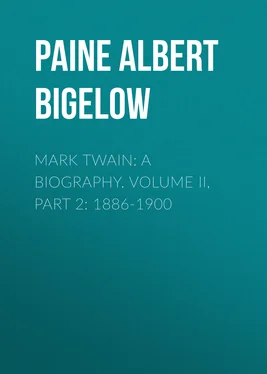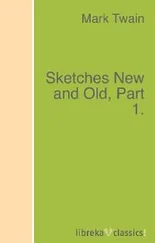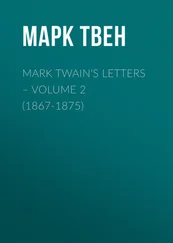Albert Paine - Mark Twain - A Biography. Volume II, Part 2 - 1886-1900
Здесь есть возможность читать онлайн «Albert Paine - Mark Twain - A Biography. Volume II, Part 2 - 1886-1900» — ознакомительный отрывок электронной книги совершенно бесплатно, а после прочтения отрывка купить полную версию. В некоторых случаях можно слушать аудио, скачать через торрент в формате fb2 и присутствует краткое содержание. Жанр: Биографии и Мемуары, foreign_antique, на английском языке. Описание произведения, (предисловие) а так же отзывы посетителей доступны на портале библиотеки ЛибКат.
- Название:Mark Twain: A Biography. Volume II, Part 2: 1886-1900
- Автор:
- Жанр:
- Год:неизвестен
- ISBN:нет данных
- Рейтинг книги:4 / 5. Голосов: 1
-
Избранное:Добавить в избранное
- Отзывы:
-
Ваша оценка:
- 80
- 1
- 2
- 3
- 4
- 5
Mark Twain: A Biography. Volume II, Part 2: 1886-1900: краткое содержание, описание и аннотация
Предлагаем к чтению аннотацию, описание, краткое содержание или предисловие (зависит от того, что написал сам автор книги «Mark Twain: A Biography. Volume II, Part 2: 1886-1900»). Если вы не нашли необходимую информацию о книге — напишите в комментариях, мы постараемся отыскать её.
Mark Twain: A Biography. Volume II, Part 2: 1886-1900 — читать онлайн ознакомительный отрывок
Ниже представлен текст книги, разбитый по страницам. Система сохранения места последней прочитанной страницы, позволяет с удобством читать онлайн бесплатно книгу «Mark Twain: A Biography. Volume II, Part 2: 1886-1900», без необходимости каждый раз заново искать на чём Вы остановились. Поставьте закладку, и сможете в любой момент перейти на страницу, на которой закончили чтение.
Интервал:
Закладка:
It was a season that closed sadly. Clemens was called to Keokuk in August, to his mother's bedside, for it was believed that her end was near. She rallied, and he returned to Onteora. But on the 27th of October came the close of that long, active life, and the woman who two generations before had followed John Clemens into the wilderness, and along the path of vicissitude, was borne by her children to Hannibal and laid to rest at his side. She was in her eighty-eighth year.
The Clemens family were back in Hartford by this time, and it was only a little later that Mrs. Clemens was summoned to the death-bed of her own mother, in Elmira. Clemens accompanied her, but Jean being taken suddenly ill he returned to Hartford. Watching by the little girl's bedside on the night of the 27th of November, he wrote Mrs. Clemens a birthday letter, telling of Jean's improved condition and sending other good news and as many loving messages as he could devise. But it proved a sad birthday for Mrs. Clemens, for on that day her mother's gentle and beautiful soul went out from among them. The foreboding she had felt at the passing of Theodore Crane had been justified. She had a dread that the harvest of death was not yet ended. Matters in general were going badly with them, and an anxiety began to grow to get away from America, and so perhaps leave sorrow and ill-luck behind. Clemens, near the end of December, writing to his publishing manager, Hall, said:
Merry Christmas to you, and I wish to God I could have one myself before I die.
The house was emptier that winter than before, for Susy was at Bryn Mawr. Clemens planned some literary work, but the beginning, after his long idleness, was hard. A diversion was another portrait of himself, this time undertaken by Charles Noel Flagg. Clemens rather enjoyed portrait-sittings. He could talk and smoke, and he could incidentally acquire information. He liked to discuss any man's profession with him, and in his talks with Flagg he made a sincere effort to get that insight which would enable him to appreciate the old masters. Flagg found him a tractable sitter, and a most interesting one. Once he paid him a compliment, then apologized for having said the obvious thing.
"Never mind the apology," said Clemens. "The compliment that helps us on our way is not the one that is shut up in the mind, but the one that is spoken out."
When Flagg's portrait was about completed, Mrs. Clemens and Mrs. Crane came to the studio to look at it. Mrs. Clemens complained only that the necktie was crooked.
"But it's always crooked," said Flagg, "and I have a great fancy for the line it makes."
She straightened it on Clemens himself, but it immediately became crooked again. Clemens said:
"If you were to make that necktie straight people would say; 'Good portrait, but there is something the matter with it. I don't know where it is.'"
The tie was left unchanged.
CLXXIV
THE MACHINE
The reader may have realized that by the beginning of 1891 Mark Twain's finances were in a critical condition. The publishing business had managed to weather along. It was still profitable, and could have been made much more so if the capital necessary to its growth had not been continuously and relentlessly absorbed by that gigantic vampire of inventions—that remorseless Frankenstein monster—the machine.
The beginning of this vast tragedy (for it was no less than that) dated as far back as 1880, when Clemens one day had taken a minor and purely speculative interest in patent rights, which was to do away with setting type by hand. In some memoranda which he made more than ten years later, when the catastrophe was still a little longer postponed, he gave some account of the matter.
This episode has now spread itself over more than one-fifth of my life, a considerable stretch of time, as I am now 55 years old.
Ten or eleven years ago Dwight Buell, a jeweler, called at our house and was shown up to the billiard-room-which was my study; and the game got more study than the other sciences. He wanted me to take some stock in a type-setting machine. He said it was at the Colt's Arms factory, and was about finished. I took $2,000 of the stock. I was always taking little chances like that, and almost always losing by it, too. Some time afterward I was invited to go down to the factory and see the machine. I went, promising myself nothing, for I knew all about type-setting by practical experience, and held the settled and solidified opinion that a successful type-setting machine was an impossibility, for the reason that a machine cannot be made to think, and the thing that sets movable type must think or retire defeated. So, the performance I witnessed did most thoroughly amaze me. Here was a machine that was really setting type, and doing it with swiftness and accuracy, too. Moreover, it was distributing its case at the same time. The distribution was automatic; the machine fed itself from a galley of dead matter and without human help or suggestion, for it began its work of its own accord when the type channels needed filling, and stopped of its own accord when they were full enough. The machine was almost a complete compositor; it lacked but one feature—it did not "justify" the lines. This was done by the operator's assistant.
I saw the operator set at the rate of 3,000 ems an hour, which, counting distribution, was but little short of four casemen's work. William Hamersley was there. He said he was already a considerable owner, and was going to take as much more of the stock as he could afford. Wherefore, I set down my name for an additional $3,000. It is here that the music begins.
It was the so-called Farnham machine that he saw, invented by James W. Paige, and if they had placed it on the market then, without waiting for the inventor to devise improvements, the story might have been a different one. But Paige was never content short of absolute perfection —a machine that was not only partly human, but entirely so. Clemens' used to say later that the Paige type-setter would do everything that a human being could do except drink and swear and go on a strike. He might properly have omitted the last item, but of that later. Paige was a small, bright-eyed, alert, smartly dressed man, with a crystal-clear mind, but a dreamer and a visionary. Clemens says of him: "He is a poet; a most great and genuine poet, whose sublime creations are written in steel."
It is easy to see now that Mark Twain and Paige did not make a good business combination. When Paige declared that, wonderful as the machine was, he could do vastly greater things with it, make it worth many more and much larger fortunes by adding this attachment and that, Clemens was just the man to enter into his dreams and to furnish the money to realize them. Paige did not require much money at first, and on the capital already invested he tinkered along with his improvements for something like four or five years; Hamersley and Clemens meantime capitalizing the company and getting ready to place the perfected invention on the market. By the time the Grant episode had ended Clemens had no reason to believe but that incalculable wealth lay just ahead, when the newspapers should be apprised of the fact that their types were no longer to be set by hand. Several contracts had been made with Paige, and several new attachments had been added to the machine. It seemed to require only one thing more, the justifier, which would save the labor of the extra man. Paige could be satisfied with nothing short of that, even though the extra man's wage was unimportant. He must have his machine do it all, and meantime five precious years had slipped away. Clemens, in his memoranda, says:
End of 1885. Paige arrives at my house unheralded. I had seen little or nothing of him for a year or two. He said:
Читать дальшеИнтервал:
Закладка:
Похожие книги на «Mark Twain: A Biography. Volume II, Part 2: 1886-1900»
Представляем Вашему вниманию похожие книги на «Mark Twain: A Biography. Volume II, Part 2: 1886-1900» списком для выбора. Мы отобрали схожую по названию и смыслу литературу в надежде предоставить читателям больше вариантов отыскать новые, интересные, ещё непрочитанные произведения.
Обсуждение, отзывы о книге «Mark Twain: A Biography. Volume II, Part 2: 1886-1900» и просто собственные мнения читателей. Оставьте ваши комментарии, напишите, что Вы думаете о произведении, его смысле или главных героях. Укажите что конкретно понравилось, а что нет, и почему Вы так считаете.












